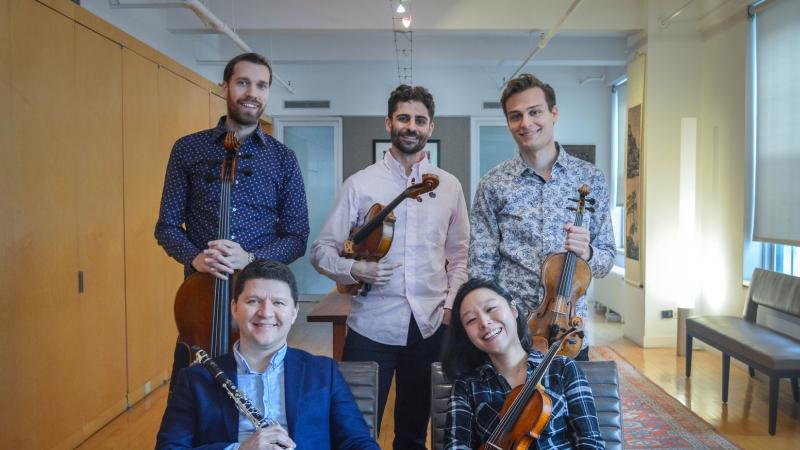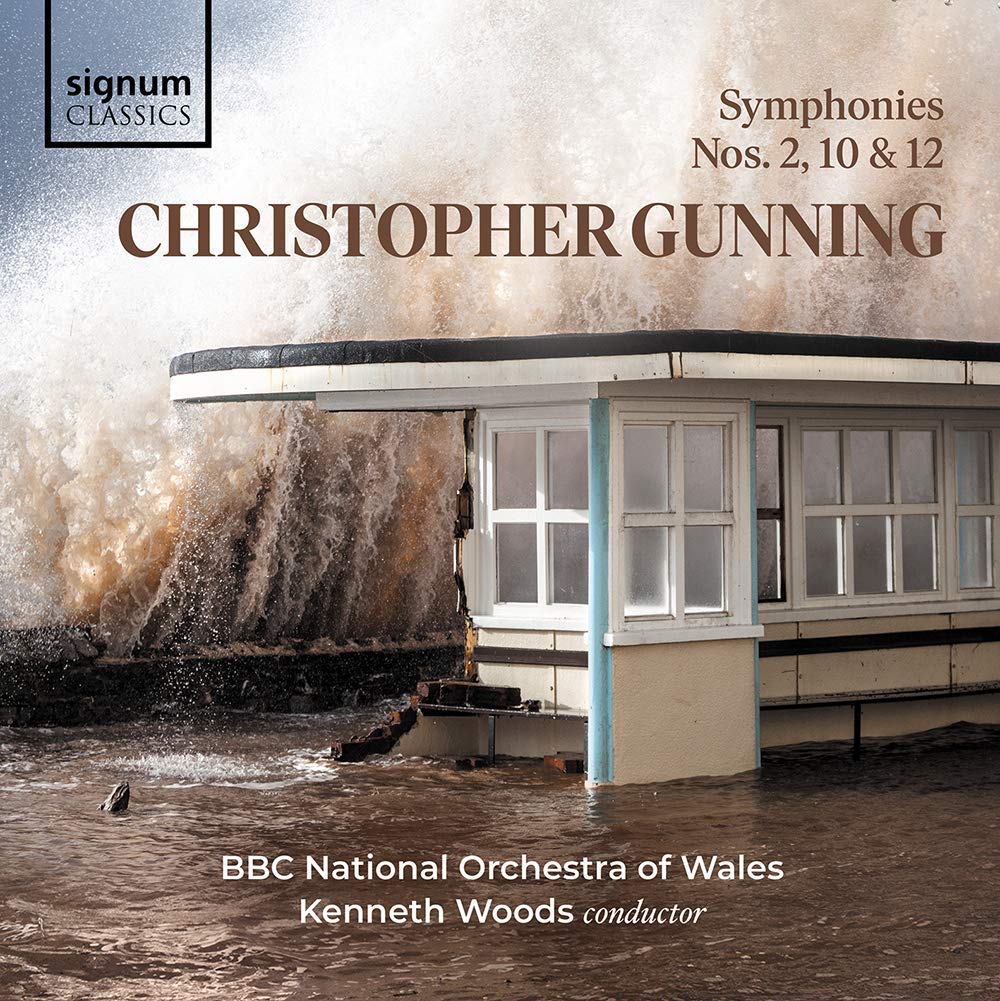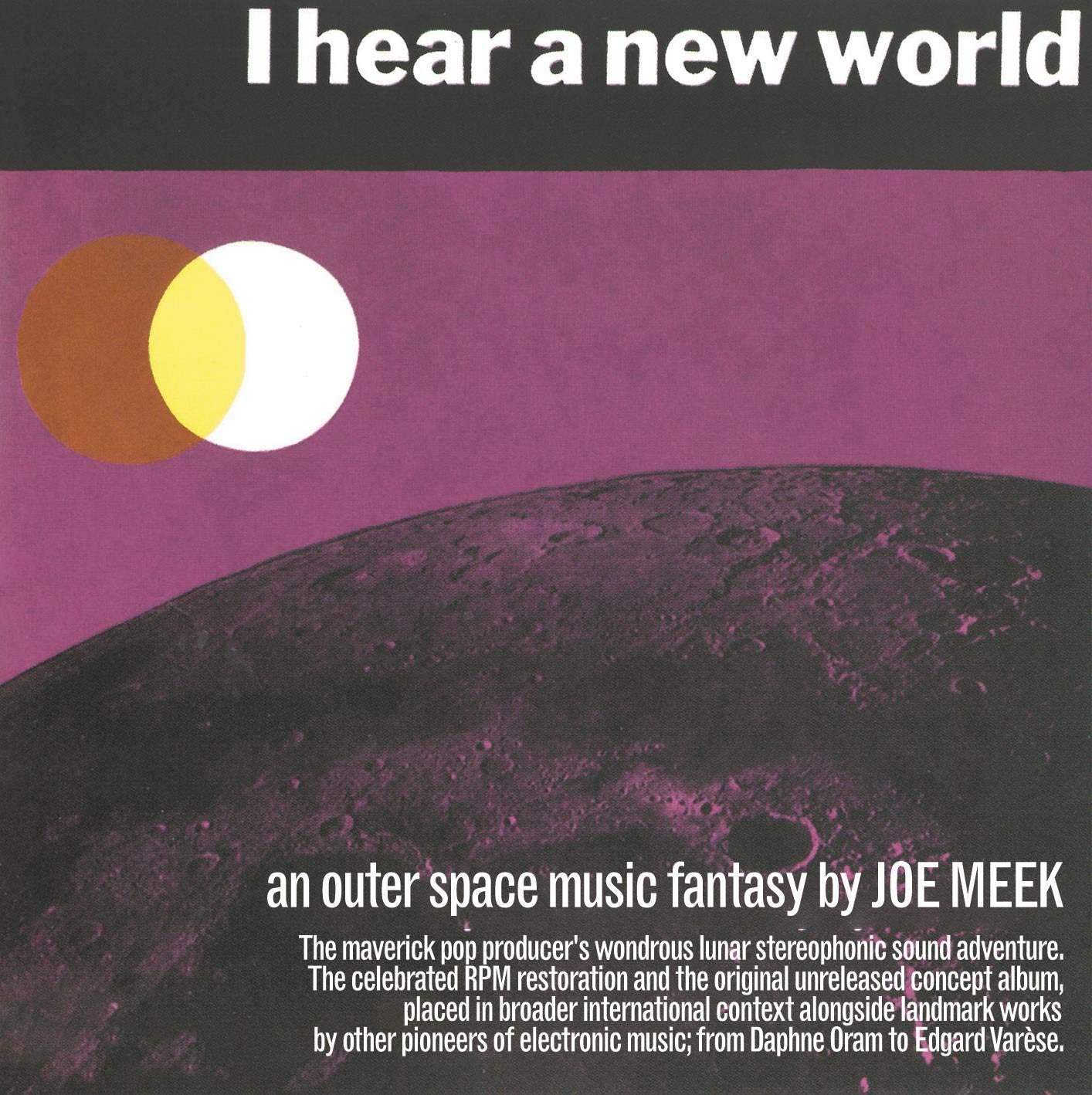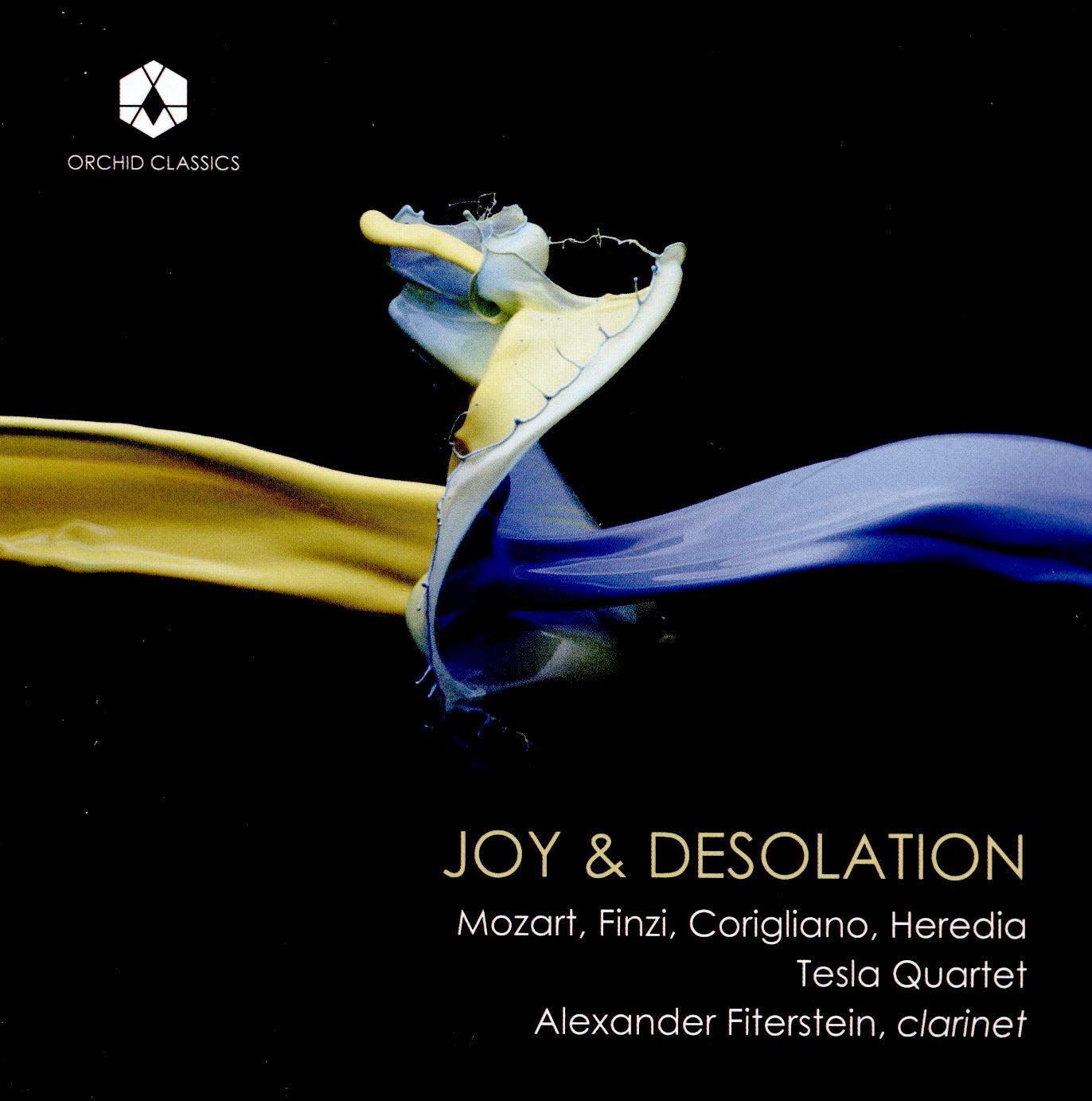Classical CDs Weekly: Christopher Gunning, Joe Meek, Tesla Quartet | reviews, news & interviews
Classical CDs Weekly: Christopher Gunning, Joe Meek, Tesla Quartet
Classical CDs Weekly: Christopher Gunning, Joe Meek, Tesla Quartet
British symphonies, post-war electronica and a disc of clarinet quintets

 Christopher Gunning: Symphonies 2, 10 & 12 BBC National Orchestra of Wales/Kenneth Woods (Signum)
Christopher Gunning: Symphonies 2, 10 & 12 BBC National Orchestra of Wales/Kenneth Woods (Signum)
You’ve probably heard Christopher Gunning’s music without realising it: he’s been a prolific film and television composer for decades. A pupil of both Edmund Rubbra and of Richard Rodney Bennett, he's best known for the insidiously catchy theme for ITV’s long-running Poirot series. Three of Gunning’s 12 symphonies are included here, written between 2003 and 2018. Whereas many contemporary film composers specialise in short, colourful bursts of descriptive music, Gunning knows how to organise and structure his ideas. Think Herrmann rather than Elfman. You sense this within seconds of 2016’s single-movement Symphony No. 10 beginning, the expressive, wandering string melody surely a nod to the start of Mahler's final symphony. Waiting for this slow theme to land, to find its feet, is thrilling, and hearing how Gunning develops it over 21 minutes is both moving and entertaining. He clearly knows his Sibelius 7th (check out the closing bars), and he's mastered the art of the seamless transition, the symphony’s various sections perfectly knitted together. It's a real find, Gunning’s broadly tonal style both distinctive and appealing. Kenneth Woods and the BBC National Orchestra of Wales audibly believe in the work: the performance is excellent.
Symphony No. 2 is a brooding three-movement work. Again, there's a superb opening, the stygian bass clarinet theme forcing the music into life. The theme’s loud reprise at the end of the symphony is one of those moments where you feel like cheering with delight. Yes, it's borderline corny, but managed so well. In Gunning's words, No. 12 came from his desire “to write something more direct, even melodic… the textures are mostly clear and uncomplicated.” There's a poignant second movement inspired by a friend’s funeral, tubular bells tolling as the symphony ebbs away. It's beautiful, the nods to Walton and Arnold never obscuring Gunning's own voice. Do investigate.
 Joe Meek: I Hear a New World (ÉL Records)
Joe Meek: I Hear a New World (ÉL Records)
Maverick record producer Joe Meek’s deeply strange concept album I Hear a New World is a nutty curio. Only four of its 12 tracks were originally released, a limited edition EP appearing in May 1960. This box set includes two versions: a 1991 restoration and a transfer of a white label pre-release LP, both in decent remasterings. Meek’s fondness for speeded up vocals is grating, but there's some fantastically offbeat music here – imagine a standard skiffle combo with outré effects, the composer's stated intention "to create a picture in music of what could be up there in outer space”. The miracle is that Meek, working from a home-made studio above a Holloway Road leather goods shop, was producing sounds not a million miles from those produced by leading lights in the European post-war avant-garde. Tape loops and home-made compressors were used, along with more prosaic techniques, like blowing bubbles with straws, tapping milk bottles and draining water from a sink. Some parts are like Varèse’s Poème Électronique with goofy tunes thrown in. Try “Magnetic Field”, its 90 seconds of electro-weirdness morphing into a stretch of catchy guitar pop.
This budget-price reissue scores by placing the Meek alongside two disc of music from other, better known exponents of early electronica. Boulez's two études from the early 1950s have curio value but aren't a whole lot of fun to listen to; Messiaen's Timbres Durées is more colourful and eventful. As is the Studie No. 1 by Stockhausen. Milhaud's La rivière endormie distorts a prerecorded radio play. Other examples come from Varèse, Xenakis, Cage and Maderna. Not for everyday listening, perhaps, but diverting. More fun are some snippets created in the BBC Radiophonic Workshop by the great Delia Darbyshire, and a catchy collaboration between producer George Martin and Maddalena Fagandini.
 Joy & Desolation Tesla Quartet, with Alexander Fiterstein (clarinet) (Orchid Classics)
Joy & Desolation Tesla Quartet, with Alexander Fiterstein (clarinet) (Orchid Classics)
We've clarinettist Anton Stadler to thank for three of Mozart’s late masterpieces, his playing inspiring the concerto, Kegelstatt Trio and the sublime Clarinet Quintet. More autumnal music is difficult to imagine, the whole work an irresistible study in mellow woodiness. It receives a nicely intimate performance from Alexander Fiterstein and the Tesla Quartet here, Fiterstein’s hushed delivery in the slow movement heartstopping. Bittersweet corners abound in late Mozart but this team don't linger on them, their reading refreshingly upbeat and positive. The last movement's variation sequence is brilliantly characterised, with a nicely affable payoff. Superb then, and fascinating to compare the work with Finzi's Five Bagatelles, heard here in an idiomatic arrangement for clarinet and string quartet. Finzi complained that the pieces “got better notices than my decent stuff”, though these miniatures are marvels of concision and understatement. Fiterstein is again impressive, never more so than in the lovely Romance.
The couplings are more recent: John Corigliano's Soliloquy is a spare, elegiac tribute to his late father, a long-serving leader of Bernstein's New York Philharmonic. Violinist Michelle Lie shines in Corigliano's high, exposed melodic writing. And lus in Bello by the Argentinean composer Carolina Heredia is a visceral response to recent events in Venezuela. Fiterstein and the Teslas tackle both works as if they own them, the playing alarmingly intense.
Explore topics
Share this article
The future of Arts Journalism
You can stop theartsdesk.com closing!
We urgently need financing to survive. Our fundraising drive has thus far raised £49,000 but we need to reach £100,000 or we will be forced to close. Please contribute here: https://gofund.me/c3f6033d
And if you can forward this information to anyone who might assist, we’d be grateful.

Subscribe to theartsdesk.com
Thank you for continuing to read our work on theartsdesk.com. For unlimited access to every article in its entirety, including our archive of more than 15,000 pieces, we're asking for £5 per month or £40 per year. We feel it's a very good deal, and hope you do too.
To take a subscription now simply click here.
And if you're looking for that extra gift for a friend or family member, why not treat them to a theartsdesk.com gift subscription?
more Classical music
 Cho, LSO, Pappano, Barbican review - finely-focused stormy weather
Chameleonic Seong-Jin Cho is a match for the fine-tuning of the LSO’s Chief Conductor
Cho, LSO, Pappano, Barbican review - finely-focused stormy weather
Chameleonic Seong-Jin Cho is a match for the fine-tuning of the LSO’s Chief Conductor
 Classical CDs: Shrouds, silhouettes and superstition
Cello concertos, choral collections and a stunning tribute to a contemporary giant
Classical CDs: Shrouds, silhouettes and superstition
Cello concertos, choral collections and a stunning tribute to a contemporary giant
 Appl, Levickis, Wigmore Hall review - fun to the fore in cabaret and show songs
A relaxed evening of light-hearted fare, with the accordion offering unusual colours
Appl, Levickis, Wigmore Hall review - fun to the fore in cabaret and show songs
A relaxed evening of light-hearted fare, with the accordion offering unusual colours
 Lammermuir Festival 2025, Part 2 review - from the soaringly sublime to the zoologically ridiculous
Bigger than ever, and the quality remains astonishingly high
Lammermuir Festival 2025, Part 2 review - from the soaringly sublime to the zoologically ridiculous
Bigger than ever, and the quality remains astonishingly high
 BBC Proms: Ehnes, Sinfonia of London, Wilson review - aspects of love
Sensuous Ravel, and bittersweet Bernstein, on an amorous evening
BBC Proms: Ehnes, Sinfonia of London, Wilson review - aspects of love
Sensuous Ravel, and bittersweet Bernstein, on an amorous evening
 Presteigne Festival 2025 review - new music is centre stage in the Welsh Marches
Music by 30 living composers, with Eleanor Alberga topping the bill
Presteigne Festival 2025 review - new music is centre stage in the Welsh Marches
Music by 30 living composers, with Eleanor Alberga topping the bill
 Lammermuir Festival 2025 review - music with soul from the heart of East Lothian
Baroque splendour, and chamber-ensemble drama, amid history-haunted lands
Lammermuir Festival 2025 review - music with soul from the heart of East Lothian
Baroque splendour, and chamber-ensemble drama, amid history-haunted lands
 BBC Proms: Steinbacher, RPO, Petrenko / Sternath, BBCSO, Oramo review - double-bill mixed bag
Young pianist shines in Grieg but Bliss’s portentous cantata disappoints
BBC Proms: Steinbacher, RPO, Petrenko / Sternath, BBCSO, Oramo review - double-bill mixed bag
Young pianist shines in Grieg but Bliss’s portentous cantata disappoints
 theartsdesk at the Lahti Sibelius Festival - early epics by the Finnish master in context
Finnish heroes meet their Austro-German counterparts in breathtaking interpretations
theartsdesk at the Lahti Sibelius Festival - early epics by the Finnish master in context
Finnish heroes meet their Austro-German counterparts in breathtaking interpretations
 Classical CDs: Sleigh rides, pancakes and cigars
Two big boxes, plus new music for brass and a pair of clarinet concertos
Classical CDs: Sleigh rides, pancakes and cigars
Two big boxes, plus new music for brass and a pair of clarinet concertos
 Waley-Cohen, Manchester Camerata, Pether, Whitworth Art Gallery, Manchester review - premiere of no ordinary violin concerto
Images of maternal care inspired by Hepworth and played in a gallery setting
Waley-Cohen, Manchester Camerata, Pether, Whitworth Art Gallery, Manchester review - premiere of no ordinary violin concerto
Images of maternal care inspired by Hepworth and played in a gallery setting
 BBC Proms: Barruk, Norwegian Chamber Orchestra, Kuusisto review - vague incantations, precise laments
First-half mix of Sámi songs and string things falters, but Shostakovich scours the soul
BBC Proms: Barruk, Norwegian Chamber Orchestra, Kuusisto review - vague incantations, precise laments
First-half mix of Sámi songs and string things falters, but Shostakovich scours the soul

Add comment